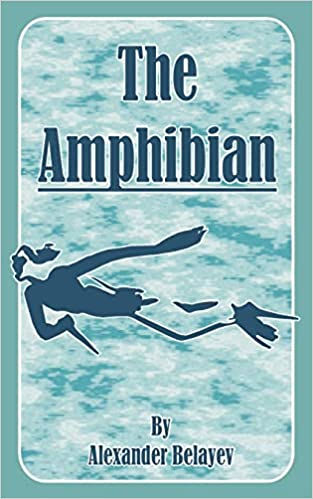
Our hero does not wear silly suits of poisonous shades of yellow and green, does not poke his trident wherever he can, and generally prefers a sharp knife. Soviet Aquaman does not fight super-villains, and is incapable of murder. He helps the needy and protects the sea from ruin. All the riches of the unrestrained water element are in front of him, but he has few friends - an old battle buddy, a dolphin, and his father.
Alexander Romanovich Belyaev born 16 March 1884 in Smolensk, Russian Empire; died 6 January 1942 in Pushkin, USSR]. Born in Smolensk, at the age of 30 Alexander became ill with tuberculosis. Treatment was unsuccessful; the infection spread to his spine and resulted in paralysis of the legs. Belyayev suffered constant pain and was paralysed for six years. In search for the right treatment he moved to Yalta together with his mother and old nanny. During his convalescence, he read the work of Jules Verne, H. G. Wells, and Konstantin Tsiolkovsky, and began to write poetry in his hospital bed.
Inspired by the "Air Salesman" I had already read, I decided to continue my acquaintance with Belyaev's books. This time I came across "Amphibian Man," another classic of good old fiction, without the crazy chases, shooting, aliens, and pathological language. Many people have read this book, or watched the old screen adaptation of the '60s.
The action takes place on the troubled coast of Argentina. Southern hemisphere, warm water, abundant sea life, a perfect environment for an amphibious man named Ichthyander. The protagonist is known on shore as "the sea devil," he is credited with terrible atrocities, less often nobility, he instills superstitious terror in the local Indians. But there is a man named Zurita among the intrepid businessmen, who is not afraid of the notorious devil, and does not mind catching him in order to gain access to the best and most expensive pearls hidden under the water column. But it is not easy to catch such a skilled swimmer.
Ichthyander's father, the famous surgeon Salvator, who has saved thousands of lives, leads a secluded life at his villa, where outsiders are forbidden entry, except for seriously and hopelessly ill people. He is a stern and unspoken man, a genius of science and possessor of golden hands. His daring experiments have gone so far that neither his contemporaries nor our own have even dreamed of them. In his quest to improve human nature, to open access to inexhaustible riches, vast territories and energy resources, Salvator gives his son Ichthyander the opportunity to live both on land and in water. And his son is happy and carefree for the time being, until he encounters a beautiful Earth girl, whom he falls in love with with no memory. And hence, as the romantics sing, all the troubles, joys, and tears.
"Amphibian Man" was published about 90 years ago, but it reads so easily and quickly, as if in the same breath. Belyaev like a magician brings the fictional characters to life, makes them a bit theatrical, but real. The colorful descriptions of the depths of the sea do not leave the reader indifferent. The pictures described are both appealing and disturbing at the same time. The abyss of the sea is one of the oldest fears of mankind, fearful of terrifying giant predators, superstitiously avoiding the site of sunken ships and sea cemeteries. The water, where sunlight hardly reaches, squeezes the head with a steel hoop, and there in the darkness can lurk anything. But at the same time, how beckoning are the green, azure and blue of secluded bays, how majestic multicolored seashells and corals, how funny and friendly dolphins, intelligent and close to us mammals. The sea is spacious, it's free, it's clean, and it's secluded.
No wonder I loved this generally simple story, because I love the sea so much.
I did not find any hidden meanings between the lines in the novel "Amphibian Man", Belyaev does not practice circumlocution, he speaks honestly, openly and directly. Exactly what he wants to say. The author condemns the thoughtless mass extraction of fish, pearls, the extermination of marine life. He despises greed and extols love and freedom. He is stuffy in dirty, noisy, dusty cities, with all its duplicitous people from whom you don't know what to expect. He marvels at the limitless possibilities of an element that is still closed to us, an element that can feed many if used rationally, become a natural source of energy, and provide a place to live. Belyaev confronts religion and science. The former seeks to destroy the results of the latter, to stop the pushing of the limits of the unexplored. The latter resists the hypocrisy of the former and rushes forward with its head held high, leaving its life to the powers that be, but not submitting. Belyaev gives traitors and vicious people a chance to mend their ways, to discard unworthy thoughts and actions. He condemns the bureaucrats and lawyers who try to profit from other people's grief.
"Amphibian Man" is not multi-layered, but a worthy novel. A sample of elegant and not cluttered with clericalisms language of the early 20th century. A time of trial, change and hope, faith in man and all the best hidden in him.
Comments